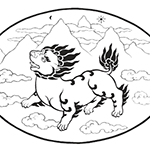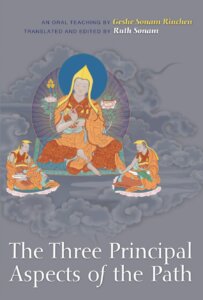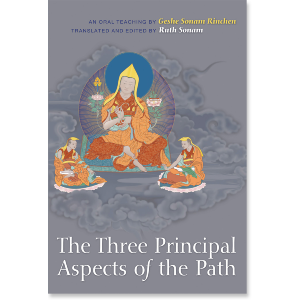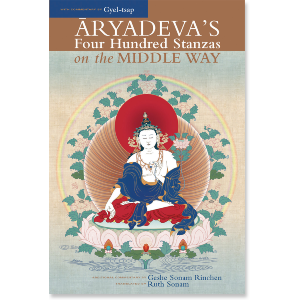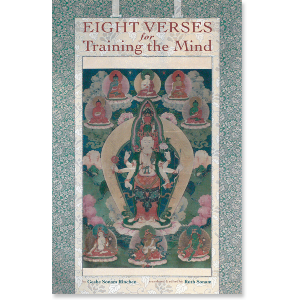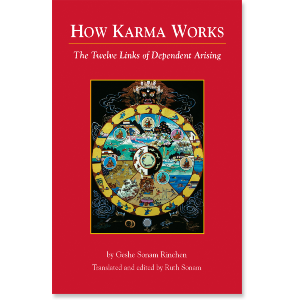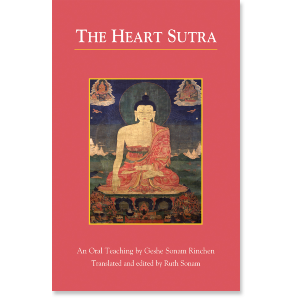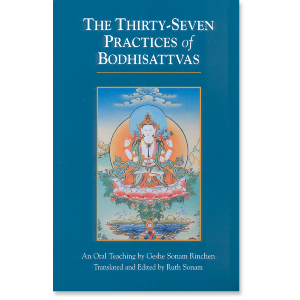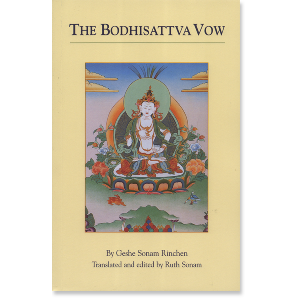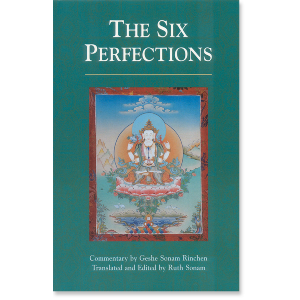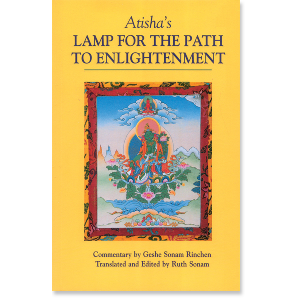| The following article is from the Summer, 1999 issue of the Snow Lion Newsletter and is for historical reference only. You can see this in context of the original newsletter here. |
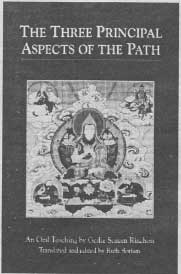
The Three Principle Aspects of the Path
By Geshe Sonam Rinchen
Edited by Ruth Sonam
Translated by Ruth Sonam
The wish for freedom, the altruistic intention to be of ultimate benefit to others, and the wisdom realizing emptiness constitute the three principal aspects of the path to enlightenment, three insights that form the indispensable support for all the practices of both sutra and tantra.
Having recognized that any state within cyclic existence involves suffering, the practitioner develops a strong wish for freedom. But to cut the root of cyclic existence it is necessary to know how things exist at the most fundamental level. Even if one has turned away from the causes of suffering and gained an undistorted understanding of reality, supreme enlightenment will remain out of reach without the altruistic intention to act selflessly for the good and happiness of all living beings.
In this teaching, Geshe Sonam Rinchen explains in clear and readily accessible terms Je Tsongkhapa's (1357-1419) short text on these three principal aspects of the path. This engaging exposition of the essential steps to enlightenment will be appreciated both by those with no previous exposure to Buddhism and by those who wish to undertake the practices of tantra, for which at least a sound understanding of these three is essential.
Geshe Sonam Rinchen was born in Tibet in 1933. He studied at Sera Je Monastery and in 1980 received the Lharampa Geshe degree. He is currently resident scholar at the Library of Tibetan Works and Archives in Dharamsala, India, where he teaches Buddhist philosophy and practice.
Ruth Sonam was born and grew up in Ireland and graduated from Oxford University with an M.A. in Modern Languages. She began studying with Geshe Sonam Rinchen in 1978 and has worked as his interpreter since 1983.
Following is a teaching from The Principal Aspects of the Path.
The Thought of Liberation
Wherever we are born in cyclic existence, whether in good or bad states, suffering is our faithful companion. There are six kinds of suffering which afflict us in all rebirths within cyclic existence. Uncertainty is the first. The very things which fascinate us, in which we place our hopes and to which we cling despite many disappointments, are utterly untrustworthy and unreliable. Our friends, from whom we expect so much, may well have been our bitter enemies in past lives and vice versa Those who are our friends now may become our foes later in life and our present foes may become our closest friends. A single word or look can change a relationship between morning and night. We join a friend for dinner, expecting to have a good time, and before the meal is over friendship has turned to enmity.
Just as drinking salt water cannot quench our thirst, no matter what we eat or drink or own, we never experience the expected satisfaction. The more we indulge, the more we crave. Our thirst for variety is never sated and as we pursue pleasure in the hope of fulfillment, we perform many negative actions which bring suffering. What we hope will still our hunger and bring gratification turns out to harm us. This lack of satisfaction is the second kind of suffering.
Through our ignorance we identify with a body formed from the sperm and ovum of others. Out of strong attachment to this body, which is quite unreliable and cannot last, we do much wrong. Despite our clinging and despite the time and energy we lavish on our troublesome body, we must relinquish it in the end and find a new one. This is the third form of suffering.
We cannot trust the glories of this world for there is constant flux between high and low, the fourth kind of suffering. The mighty fall from power and their subordinates take their places. The rich are reduced to penury overnight and the poor win the lottery. Everything changes.
The fifth form of suffering is that while we remain in cyclic existence we are alone and cannot depend on friendship. We spend some time with others, like guests in a hotel who stay for a while and then disperse in different directions, or like people who gather on market-day and then go their separate ways. Our friendships last just a short while. Shantideva says:
When you are born, you're born alone
And also when you die, you die alone.
If others cannot share your suffering,
What is the use of hindering friends?
We are born and die alone. In between we create much non-virtue for the sake of our friends and loved ones, yet they cannot share the suffering this will bring us. We alone must bear it. Understanding the transitory nature of friendship, we should love and help those we call our friends without being attached to them and without letting our feelings for them hamper our spiritual practice.
The sixth kind of suffering is that we are conceived and born again and again. Each time we have to give up our body and begin once more. Unless we intervene this process will continue endlessly. When we gain direct perception of reality, the end of this cycle of involuntary birth and death is finally in view.
If you contemplate this brief summary of the many drawbacks of cyclic existence, it will encourage you to recognize your unique good fortune in having a sound body and mind. Your future well-being or misfortune depends on how you use them, so take care to make the right choice. What could be better than to devote your energy to developing these three principal insights, beginning with the wish to leave cyclic existence? This is the best way to make your life meaningful.
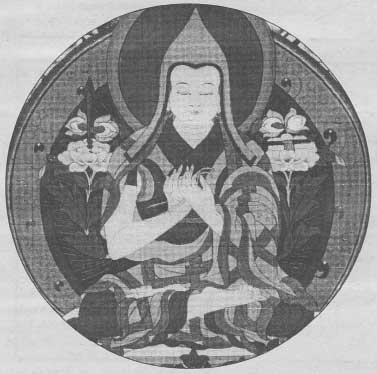
Sometimes when we read or hear the teachings, we may feel that there is so much to remember eight of this, six of that and on and on. However, our memory has the capacity easily to store masses of facts. We absorb so much useless information from the media in the course of each day. If we see a practical application for what we learn from the teachings, all the better, since that will help us to retain and use it. But even if it does not seem immediately relevant, we can store what we learn for a time when it may come in useful. If we receive a precious gift, we feel happy and put it away carefully, even though we may not have any immediate use for it.
If, as it is said, just hearing the names of great masters like Asanga and Nagarjuna can protect us from bad rebirths, contemplating what they have written must surely provide greater protection. In his set of five treatises on the different levels Asanga defines the three kinds of suffering within which every kind of suffering can be included. He says the suffering of pain is that which is painful when it arises and while it lasts. That which is pleasurable when it arises and pleasurable while it lasts but is followed by pain when it stops, is the suffering of change. In fact everything impermanent that is produced through contaminated actions underlain by disturbing emotions is miserable and unsatisfactory.
Imagine you have a festering boil that has come to a head. When you pour cool water on it, you feel momentary pleasure. All contaminated pleasure and happiness is the suffering of change because the moment it stops, suffering of some kind starts. Asanga also views all mental activities and states of mind accompanying such contaminated pleasurable feelings as the suffering of change. The objects which induce these feelings are also included within this category of suffering because when they are removed, the pleasure ceases.

When disagreeable feelings arise and you experience pain, try hard not to allow this to make you angry, by remembering that your body and mind are a mass of causes which produce suffering at the slightest provocation.

Now imagine that salt is rubbed into your boil or that something sharp touches its head. This creates intense overt pain. Contaminated painful feelings constitute the suffering of pain. When nothing cooling nor anything irritating comes in contact with the boil, neither pleasure nor outright pain occur. Contaminated neutral feelings are said to be the pervasive suffering of conditioning because they contain the imprints, causes and seeds for suffering and for the disturbing emotions.
All pleasurable feelings are not the suffering of change, since there are feelings of pleasure which are uncontaminated, such as the pleasure accompanying direct perception of selflessness. All pain does not necessarily constitute true suffering, the first noble truth. For instance, someone who has perceived reality directly and attained an uncontaminated path of insight may experience mental pain on realizing how much they still don't know. This pain is part of a true path and not an example of true suffering, since it does not result from contaminated actions underlain by disturbing emotions.
All neutral feelings are not the pervasive suffering of conditioning, since there are three kinds of neutral feelings: virtuous, non-virtuous and unspecified. Virtuous neutral feelings may be contaminated and uncontaminated. The latter are not an instance of the pervasive suffering of conditioning.
The three kinds of contaminated feelings give rise to disturbing emotions. Pleasurable feelings arouse craving, while disagreeable feelings provoke anger. Neutral feelings lead to confusion which, for instance, wrongly takes what is impermanent to be permanent and what is unsatisfactory to be pleasurable. These disturbing emotions induce suffering. How obvious this is when craving makes us reach out for something whose attractiveness our incorrect mental approach has exaggerated! Unable to obtain what we have projected, which in reality does not exist, we suffer frustration and disappointment. This easily arouses anger, which is distressing now and creates future suffering. Confusion nourishes attachment and anger and makes us cling to suffering and its causes.
Practice focuses on interrupting the process by which feelings induce suffering. Instead of mistaking contaminated pleasurable feelings for real happiness, learn to recognize them as a form of suffering and stop attachment to them. When disagreeable feelings arise and you experience pain, try hard not to allow this to make you angry, by remembering that your body and mind are a mass of causes which produce suffering at the slightest provocation. To avoid the intense pain that comes when a head forms on the boil, you must deal with the boil itself. While you have a contaminated body and mind, pain cannot be avoided and will continue to occur.
From the Madhyamika viewpoint the three kinds of suffering are identified with painful, pleasurable and neutral feelings as described by Asanga. However, contaminated pleasurable feelings are not regarded as real pleasure but seen as a mere alleviation and diminution of suffering. They occur at the point when intense suffering of one kind has subsided and a new kind of suffering is beginning but has not yet become apparent. If this were real pleasure, it should increase as we continue to d# what induces it. But we know that as we go on eating or indulging in other sensual pleasures, the feelings and sensations eventually become disagreeable. Suffering on the other hand is real because the more contact we have with what induces it, the more intense the suffering becomes.
Wherever we are born in the six realms with a body and mind which have resulted from contaminated actions and disturbing emotions, suffering is present. If you are carrying a heavy load, you can find no relief until you put it down. The surest sign that your body and mind hold the seeds of disturbing emotions and suffering is the fact that even the most minor circumstance can precipitate both.
In The Three Principal Aspects of the Path Tsongkhapa explains the practices of the initial and intermediate levels in relation to developing the wish to leave cyclic existence. In the contemplation of suffering, emphasis on stopping your own suffering leads to a strong wish to be free from the cycle of involuntary birth and death, whereas concern to stop others' suffering gives rise to compassion. How can you develop the great compassion wishing to free others from their suffering, unless you recognize, are moved by and want to be rid of your own suffering?
When through such familiarity not even a moment's longing,
Arises for the marvels of cyclic existence,
And if day and night you constantly aspire to freedom,
You have developed the wish to leave cyclic existence.
As a result of repeatedly contemplating impermanence, the suffering of bad rebirths, the connection between actions and their effects and the suffering experienced in good rebirths, you come to see life in cyclic existence, even in the best celestial rebirth, as essenceless, and no worldly wealth, not even the fabulous riches of gods like Brahma and Indra, can tempt you.
A mother whose only child has gone missing can think of nothing else. Even her dreams are haunted by the longing to know what has happened and to hear some good news. This is her first thought on waking. When the thought of gaining liberation is, in the same way, foremost in your mind at all times, day and night, you have developed the wish to leave cyclic existence.

